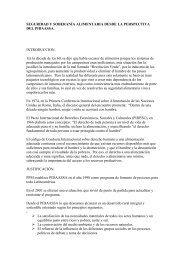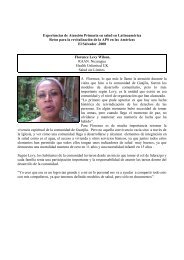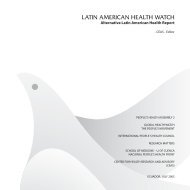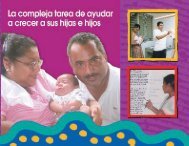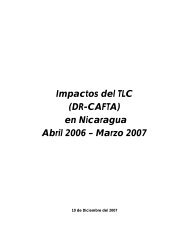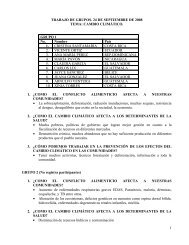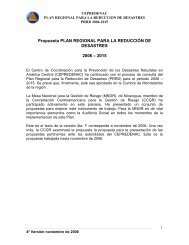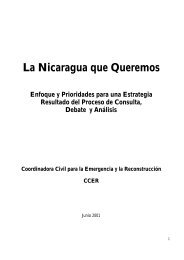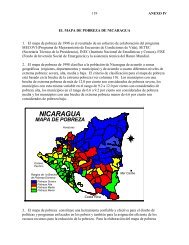A Gendered Analysis of the Social Protection Network in ... - CISAS
A Gendered Analysis of the Social Protection Network in ... - CISAS
A Gendered Analysis of the Social Protection Network in ... - CISAS
Create successful ePaper yourself
Turn your PDF publications into a flip-book with our unique Google optimized e-Paper software.
The documentation also suggests that <strong>the</strong> idea <strong>of</strong> <strong>the</strong> RPS is to change <strong>the</strong> behaviour <strong>of</strong><br />
families <strong>in</strong> terms <strong>of</strong> <strong>the</strong> formation <strong>of</strong> human capital and that <strong>the</strong> programme seeks to<br />
promote a ‘responsible attitude’ among families (BID 2003). Such comments besides<br />
be<strong>in</strong>g highly paternalistic, assume that <strong>the</strong> behaviour <strong>of</strong> families is at present a problem.<br />
That is <strong>the</strong> assumption is that families do not know how to behave properly <strong>in</strong> terms <strong>of</strong><br />
reduc<strong>in</strong>g health risks nor do <strong>the</strong>y understand <strong>the</strong> value <strong>of</strong> education. It could be<br />
contended that on <strong>the</strong> contrary education and health are highly prized but barely<br />
reachable goals for families liv<strong>in</strong>g <strong>in</strong> extreme poverty. The focus suggests <strong>the</strong> problem is<br />
<strong>the</strong> ‘bad’ behaviour <strong>of</strong> <strong>in</strong>dividuals or families, ignor<strong>in</strong>g <strong>the</strong> structural <strong>in</strong>equalities that<br />
determ<strong>in</strong>e that behaviour and shift<strong>in</strong>g blame from wider society to <strong>the</strong> <strong>in</strong>dividual or <strong>in</strong><br />
effect – blam<strong>in</strong>g <strong>the</strong> victim.<br />
A study undertaken <strong>in</strong> July <strong>of</strong> 2001 (Bradshaw 2002 b) showed that <strong>the</strong> great majority <strong>of</strong><br />
women <strong>in</strong>terviewed already shared <strong>the</strong> government’s view <strong>of</strong> <strong>the</strong> importance <strong>of</strong><br />
education for both boys and girls. However, <strong>the</strong> reasons for valu<strong>in</strong>g education are not as<br />
straightforward as may be assumed and not necessarily those <strong>of</strong> <strong>the</strong> government. The<br />
recent national development plan (Gobierno de Nicaragua 2003: 15) clearly states that<br />
<strong>the</strong> government is <strong>in</strong>vest<strong>in</strong>g <strong>in</strong> human capital to “<strong>in</strong>crease <strong>the</strong> productivity <strong>of</strong> <strong>the</strong> workers<br />
and <strong>the</strong>ir work”. In comparison, only a small proportion <strong>of</strong> women <strong>in</strong> <strong>the</strong> study gave<br />
future employment benefits as <strong>the</strong> ma<strong>in</strong> value perta<strong>in</strong><strong>in</strong>g to education. In fact education<br />
was valued not for what it could br<strong>in</strong>g, but ra<strong>the</strong>r what it was thought to stop, most<br />
specifically ‘del<strong>in</strong>quency’ <strong>in</strong> young men (52% <strong>of</strong> <strong>the</strong> women <strong>in</strong>terviewed responded <strong>in</strong><br />
this form). In terms <strong>of</strong> young women education was also seen as important <strong>in</strong> order that<br />
<strong>the</strong>y could ‘look after <strong>the</strong>mselves’ <strong>in</strong> later life and not be ‘taken <strong>in</strong>’ or ‘fooled’ by o<strong>the</strong>rs,<br />
most notably men. These notions have both economic and social elements as <strong>the</strong><br />
follow<strong>in</strong>g quotes demonstrate: “Women should learn to wash, to cook and to read so<br />
that <strong>the</strong>y don’t get fooled” or more explicitly “When you know how to read and write<br />
you learn how to work and <strong>the</strong>y can’t fool you”.<br />
It would seem that education is highly valued by <strong>the</strong> poor, but that <strong>the</strong> benefits are<br />
conceptualised <strong>in</strong> social ra<strong>the</strong>r than economic terms. In fact <strong>in</strong> economic terms<br />
education may be seen to br<strong>in</strong>g costs ra<strong>the</strong>r than benefits. In <strong>the</strong> short run <strong>the</strong> costs<br />
<strong>in</strong>clude books, uniforms and <strong>the</strong> opportunity cost <strong>of</strong> lost <strong>in</strong>come for those children<br />
<strong>in</strong>volved <strong>in</strong> <strong>in</strong>come generat<strong>in</strong>g activities. In <strong>the</strong> short run <strong>in</strong>vestment <strong>in</strong> human capital<br />
may be associated with reductions <strong>in</strong> well-be<strong>in</strong>g. <strong>Analysis</strong> <strong>of</strong> <strong>the</strong> factors that <strong>in</strong>fluence<br />
perceptions <strong>of</strong> decl<strong>in</strong>es and improvements <strong>in</strong> well be<strong>in</strong>g based on <strong>the</strong> data collected via<br />
<strong>the</strong> civil society <strong>Social</strong> Audit <strong>in</strong>itiative (see L<strong>in</strong>neker 2002) suggests that if a poor<br />
household has a child <strong>in</strong> school, irrespective <strong>of</strong> household type, <strong>the</strong>y were more likely to<br />
feel worse <strong>of</strong>f and experience decl<strong>in</strong>es <strong>in</strong> well-be<strong>in</strong>g than households without a child <strong>in</strong><br />
school.<br />
What <strong>the</strong> RPS actually proposes is us<strong>in</strong>g ‘well be<strong>in</strong>g’ <strong>in</strong>centives to ensure human capital<br />
form<strong>in</strong>g behaviour. To benefit f<strong>in</strong>ancially families have to commit to send<strong>in</strong>g <strong>the</strong>ir<br />
children to school and to health centres to receive basic health care services such as<br />
vacc<strong>in</strong>ations. They also have to commit to improv<strong>in</strong>g <strong>the</strong>ir nutritional state and<br />
attendance at a series <strong>of</strong> educational sessions about health (6 per year) that provide<br />
tra<strong>in</strong><strong>in</strong>g on reproductive and sexual health, nutrition, <strong>in</strong> ‘environmental health’ and family<br />
hygiene, and <strong>in</strong> child care and breast feed<strong>in</strong>g. If <strong>the</strong>y do not fulfil <strong>the</strong>se obligations <strong>the</strong>n<br />
<strong>the</strong>ir benefits are temporarily withdrawn or may be cancelled. In return a family may<br />
receive one or more <strong>of</strong> <strong>the</strong> <strong>in</strong>centives <strong>of</strong>fered, that <strong>in</strong>clude a school pack (worth $20 per<br />
6




